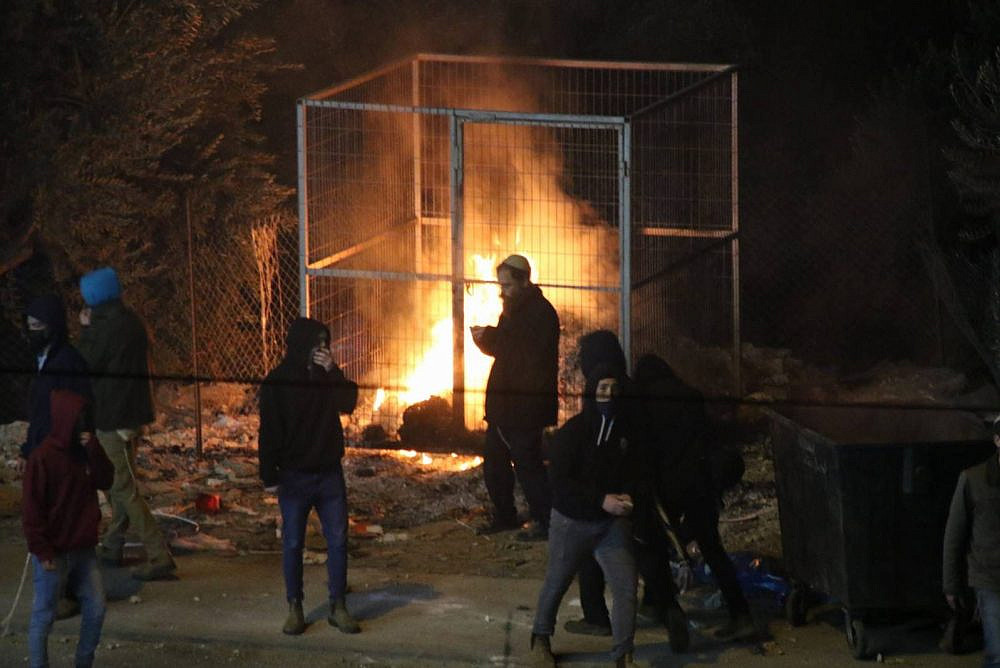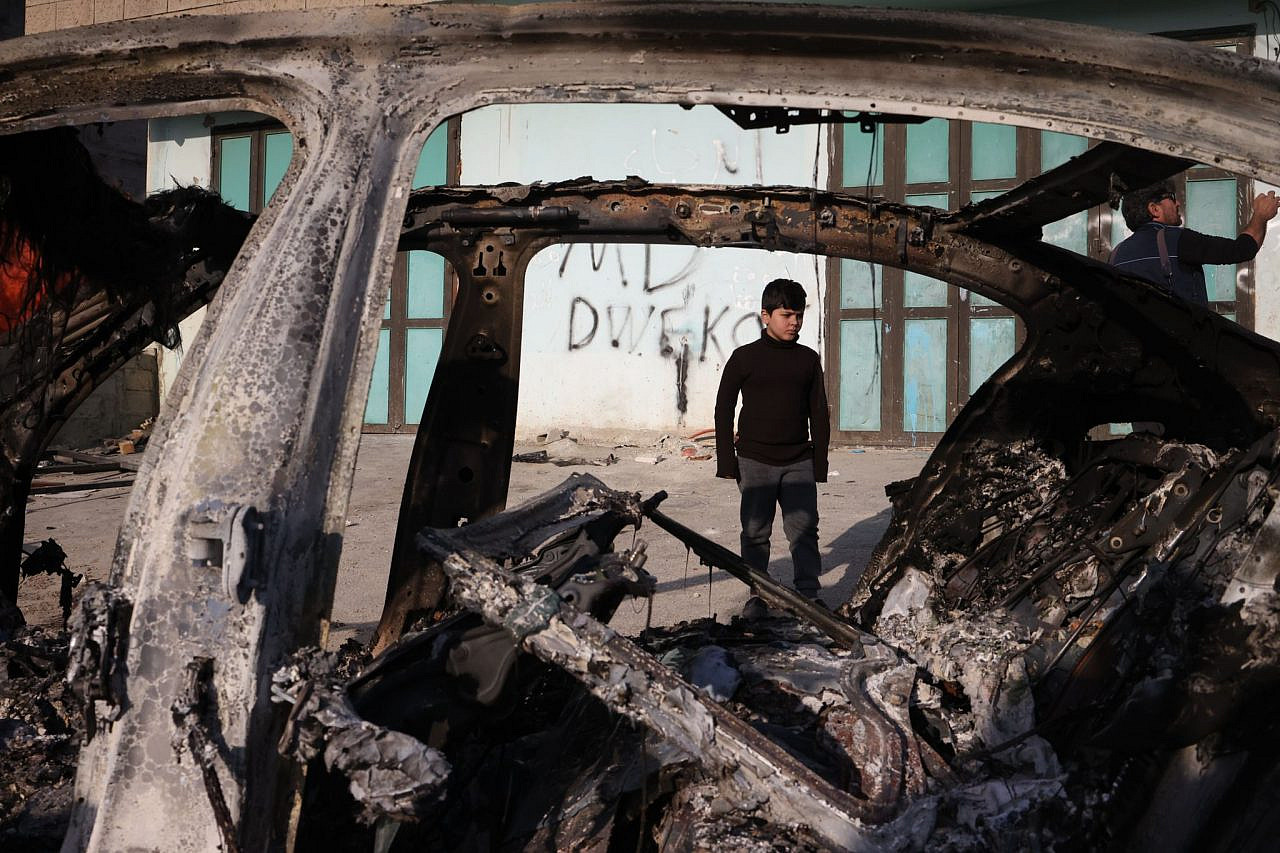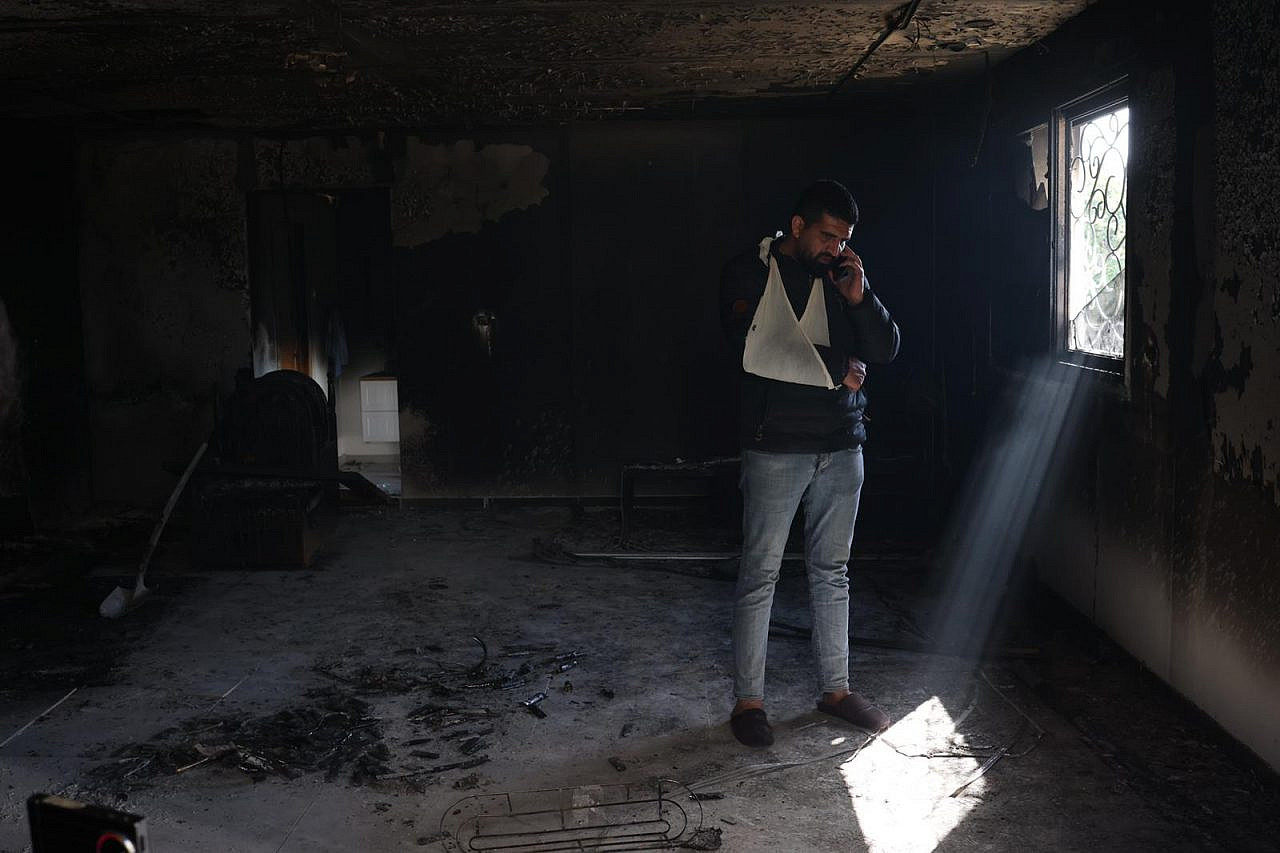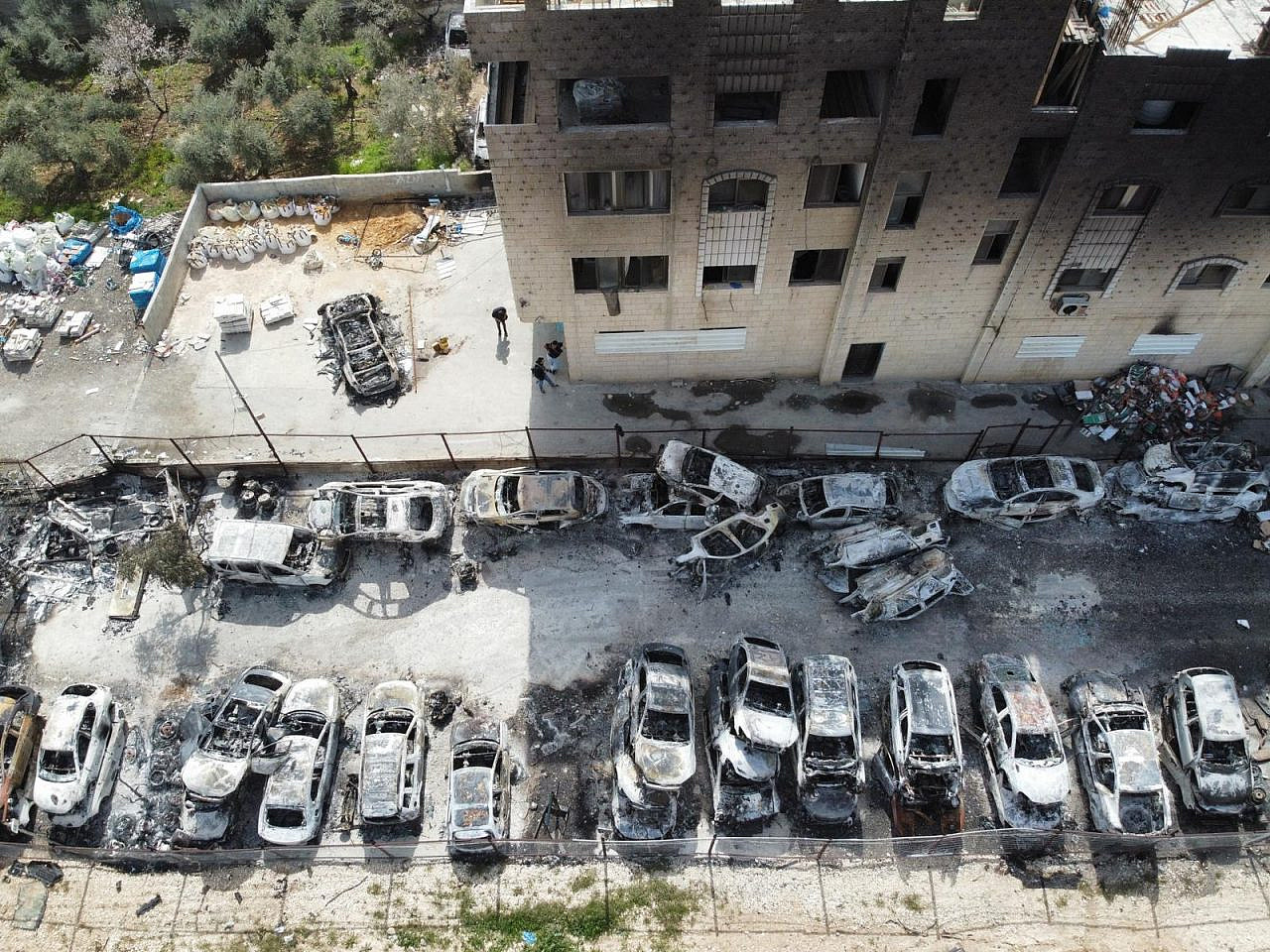Huwara Reels after Night of Settler Terror under Israeli Army’s Watch
PALESTINE - ISRAEL, 20 Mar 2023
Oren Ziv | +972 Magazine - TRANSCEND Media Service
Palestinians in the West Bank town were left to deal with burned-out buildings and cars after hundreds of settlers ran riot while soldiers protected them.

Israeli settlers burn Palestinian homes, vehicles, and businesses during a rampage in the West Bank town of Huwara, Feb. 26, 2023. (Activestills)
27 Feb 2023 – “The settlers attacked, I saw them. They burned the car that was parked under the house. The army came and told us to shut the door. My sister went down, we locked the door with a key. [The settlers] came and broke things all around us. We were besieged, we couldn’t get out. Someone yelled at us to get down, but I didn’t want to. They told us to open the door, saying it’s the fire department. When I left in the morning, I saw that the whole place was burned.”
This is how seven-year-old Juwad Sultan described the pogrom on Sunday night in Huwara, in the occupied West Bank. Hundreds of settlers entered the town just hours after a Palestinian fatally shot two brothers — Yagel and Hillel Yaniv, settlers from the nearby settlement of Har Bracha — at the entrance to the town.
By Monday morning, Huwara, a centrally located town through which thousands of Palestinians and settlers travel every day, looked like a battlefield. The town council reported that settlers had torched eight homes, broken windows in 35 others, and set fire to 250 vehicles. More than 120 people were wounded, including one Palestinian with a serious head wound who is currently hospitalized in Nablus. An Israeli shot and killed Sameh Aqtash, 37, from the nearby village of Za’atara. It is still unclear whether he was gunned down by settlers or soldiers.
Immediately following the murders of the two Israelis, which took place early Sunday afternoon, the army closed Tapuah Junction, a major traffic artery nearby, as well as the entrance to Huwara used by Israelis living in the Yitzhar settlement, just northwest of the town. However, despite these closures, numerous eyewitnesses reported that the army allowed settlers to enter Huwara on foot, while preventing journalists, medics, and Palestinian aid workers from doing the same.

On Monday morning, after the rampage had ended, the roads were strewn with stones, tear gas grenades, and burned tires, which the settlers reportedly used to set homes on fire. Residents said they could not remember any comparable event ever taking place in their town. In recounting their experience of the previous night many mentioned the murder of the Dawabshe family, whom settlers burned alive in their home in the West Bank village of Duma, in 2015.
‘The army gave them support’
In the hours after the pogrom, professional pro-Israel activists began circulating a photo online, showing two Israeli soldiers helping an elderly Palestinian woman walk away from a burning building. The photo was presented as proof of the Israeli army’s benevolence and morality, yet eyewitness testimonies and survivors of the pogrom describe how the military aided and abetted the settlers, contradicting the portrayal of Israeli soldiers as Huwara’s saviors.
Sharif Sultan, seven-year-old Juwad’s father, stood outside his home, surveying the destruction. “We were at home, everything was normal, when [neighbors] said that settlers had arrived,” he said. “Between 400 and 500 settlers came. They broke the windows, threw big stones, and broke the door. We called the army, everyone, but nothing happened.” Sultan said that the soldiers who were present stood nearby and did nothing to stop the carnage. “The army stood there, giving them support,” he said.
Sultan, a car salesman, had much of his livelihood destroyed in the pogrom. Dozens of cars he had bought were now destroyed, and he estimates the total damage to be NIS 1.5 million ($400,000). “There is nothing left,” he said.
“There is no one to protect us, except God,” said Mohannad Odeh, another resident. “The settlers came with a large number of soldiers. They did what they wanted: they burned, beat, stole.”
Eventually, only upon realizing that they had lost control of the situation, army officials sent reinforcements to clear the settlers out of the town. Although one Palestinian was killed, dozens were wounded, and hundreds of homes and vehicles were set ablaze, the military arrested just eight settlers. Six of the arrestees have since been released: five returned home immediately after being questioned at the police station, while one was released to house arrest on Monday morning.

Meanwhile, the pogrom received overt support from numerous public figures and settler journalists. A reporter for the settler outlet Hilltop News, who broadcast live from the scene as flames engulfed homes and cars in the background, told the camera: “There is something terribly exciting here. Simple Jews came and committed a natural act of revenge.”
Elchanan Groner of The Jewish Voice, another far-right settler outlet, wrote:
Whether you like it or not, deterrence works! In the last few hours, Arabs have called at least one civil security official with requests and pleas to protect them so that their houses will not be burned down. I prefer this to their celebration and the distribution of sweets after an attack [which reportedly occurred in Nablus after the killing of the Yaniv brothers]. It is a shame that the IDF didn’t realize a long time ago that it needs to carry out painful retaliatory and deterrent actions against the enemy.
Following the attack, Davidi Ben-Zion, the deputy head of the Samaria Regional Council, took to Twitter to call for Huwara to be “erased.” “Enough talk about building and strengthening settlements, deterrence must be restored immediately and there is no room for mercy,” Ben-Zion wrote. Finance Minister Bezalel Smotrich liked the tweet, which Ben-Zion later deleted. Last week, Smotrich was handed sweeping control over the Civil Administration, the body responsible for the day-to-day lives of Palestinians living in the occupied territories.
Prime Minister Benjamin Netanyahu called on settlers “not to take the law into their own hands.” Defense Minister Yoav Galant complained that settler attacks “interfere” with the army’s attempts to catch the perpetrators of the attack that killed the settlers. Israel’s highest-ranking officials seemed to be implying that the central problem with Jewish terrorism is the way it interferes with the army’s activities.
‘If you go out, the army will shoot you’
Amer al-Madi, whose house was completely destroyed in the arson attacks, was at work in Nablus when the settlers entered the town. “We were told that there was a settler march, which is a normal occurrence — but not like this one,” he explained. Al-Madi said that despite a large traffic jam at the Huwara intersection, he eventually managed to reach his neighborhood.

“The army blocked us from entering the house,” he recalls. “We argued with them: I said, ‘I have children at home, they are attacking my house!’ They replied: ‘You cannot enter.’” In the end, al-Madi managed to get to his home. “I saw 200 or 300 settlers in front of the house. The children, my wife, and my mother said that settlers came, broke the glass. The house burned down. The children were terrified. At night they cried, they couldn’t sleep.”
Al-Madi says that the attack was the first time he has encountered settler violence of this kind. “The settlers were like animals, not human beings. They divided the work between them: one group for breaking, a second group for setting fire. No one interfered.” Al-Madi himself was wounded in the arm by a stone that was thrown at him.
Mamdouh al-Madi, one of Amer’s relatives, said that the army used gas to “suffocate” the residents. “We are not afraid of [the settlers],” said Mamdouh, “but if you leave your house, the army will shoot at you. They will destroy your house, and you cannot defend yourself. The world needs to see the barbarity of the settlers and the support they receive from the army.”
“We are against the killings that happened yesterday,” said one of the residents, referring to the deaths of the two settlers. “But what do the thousands of people who live here have to do with it? People were in their homes with their children when everything was burning around them. You can’t describe the feeling.”
Ahmed Dumidi, another resident of Huwara, said that the situation in the town has gotten significantly worse since the new government came to power. “There has been a big change since Ben Gvir,” said Dumidi of Israel’s new far-right national security minister. “It’s dangerous to walk around alone, any settler or soldier can come and open fire.
“There were settlers last night who were in military garb and were carrying weapons, like a private militia,” Dumidi continued. “Who are we going to talk to? The army doesn’t protect us, the Palestinian Authority cannot protect us. We live in a prison. Yesterday, when I saw everything burning, I thought I would die.”
_____________________________________________
A version of this article was originally published in Hebrew on Local Call. Read it here.
Oren Ziv is a photojournalist, reporter for Local Call, and a founding member of the Activestills photography collective.
Tags: BDS Boycott Divestment Sanctions, Colonialism, Cultural violence, Direct violence, Ecocide, Gaza, Genocide, Israeli Apartheid, Israeli Army, Israeli occupation, Middle East, Nakba, Palestine, Palestine/Israel, Sociocide, State Terrorism, Structural violence, Violent conflict, West Bank, Zionism
Join the BDS-BOYCOTT, DIVESTMENT, SANCTIONS campaign to protest the Israeli barbaric siege of Gaza, illegal occupation of the Palestine nation’s territory, the apartheid wall, its inhuman and degrading treatment of the Palestinian people, and the more than 7,000 Palestinian men, women, elderly and children arbitrarily locked up in Israeli prisons.
DON’T BUY PRODUCTS WHOSE BARCODE STARTS WITH 729, which indicates that it is produced in Israel. DO YOUR PART! MAKE A DIFFERENCE!
7 2 9: BOYCOTT FOR JUSTICE!
DISCLAIMER: The statements, views and opinions expressed in pieces republished here are solely those of the authors and do not necessarily represent those of TMS. In accordance with title 17 U.S.C. section 107, this material is distributed without profit to those who have expressed a prior interest in receiving the included information for research and educational purposes. TMS has no affiliation whatsoever with the originator of this article nor is TMS endorsed or sponsored by the originator. “GO TO ORIGINAL” links are provided as a convenience to our readers and allow for verification of authenticity. However, as originating pages are often updated by their originating host sites, the versions posted may not match the versions our readers view when clicking the “GO TO ORIGINAL” links. This site contains copyrighted material the use of which has not always been specifically authorized by the copyright owner. We are making such material available in our efforts to advance understanding of environmental, political, human rights, economic, democracy, scientific, and social justice issues, etc. We believe this constitutes a ‘fair use’ of any such copyrighted material as provided for in section 107 of the US Copyright Law. In accordance with Title 17 U.S.C. Section 107, the material on this site is distributed without profit to those who have expressed a prior interest in receiving the included information for research and educational purposes. For more information go to: http://www.law.cornell.edu/uscode/17/107.shtml. If you wish to use copyrighted material from this site for purposes of your own that go beyond ‘fair use’, you must obtain permission from the copyright owner.
Read more
Click here to go to the current weekly digest or pick another article:
PALESTINE - ISRAEL:
